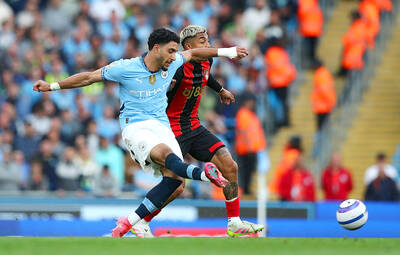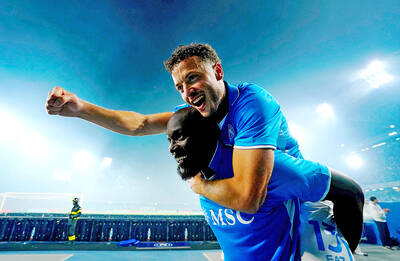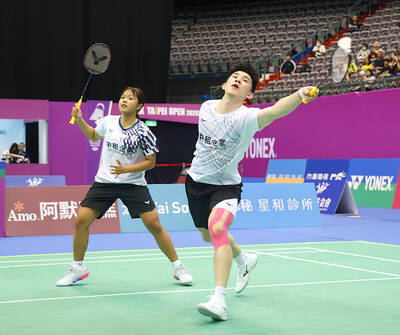The flags are up and the fans are frenzied, but that doesn't mean everyone in the Middle East will be able to flip on the TV and see the World Cup.
Soccer fever is getting a dose of market reality: A billionaire satellite-TV impresario who scooped up exclusive broadcasting rights across the region is charging fees steep enough that many won't be able to watch.
On the eve of the tournament, governments are scrambling as if it's an issue of national security.
In Egypt, the head of the state satellite Nile Sport Channel urged UN intervention to protect what he called a "human right."
Jordan's king distributed free receivers to the military and ordered that public screens be set up so low-income citizens can watch. Saudi Arabia's ruler ordered that his nation's games be broadcast on national TV and Algeria's president sent his communications minister to negotiate the airing of matches.
In impoverished Yemen, pirates will try to save the day. Entrepreneurs with subscriptions are selling illegal cable hookups to their neighbors for about US$5 a pop -- far less than the cost of the satellite package.
The scramble began when viewers across the Arab world realized they wouldn't be able to watch the World Cup on free national TV. The rights belong to Arab Radio and Television (ART), a satellite pay-TV network owned by Saudi businessman Sheik Saleh Kamel.
Subscription costs differ by country but are generally beyond the means of the average Arab citizen. In Lebanon an annual subscription runs US$180; the cost reaches US$398 in Jordan.
Soccer has long been a favorite sport among Arabs, so it comes as no surprise that governments took action. And keeping people, especially troublemakers, off the streets might help explain why governments were so eager to intervene.
The game offers relief in a region deluged with daily doses of bad news -- carnage in Iraq, Iran's nuclear tensions with the West, raids in the Palestinian territories. During Lebanon's 1975-90 civil war, shooting would stop when games were played. In Egypt, Algeria and Morocco, soccer is nearly a religion.
Which is why not being able to see the World Cup amounts to a crisis. So far, most of the news has been bad.
Morocco's communications minister confessed in parliament last week that the two national public TV stations can't afford the US$13 million broadcast fee that ART is demanding. Barring an last-minute agreement, Moroccans will see a 20-minute summary of individual World Cup games.
In Egypt, talks between state-run television and ART are stalemated.
"I will just have to subscribe to ART," moaned Shadi Azer, an Egyptian engineer. "Forget about going to the beach, buying summer clothes, or any other entertainment this year."
To offset the frustrations, Egypt's ruling National Democratic party, members of parliament and sports officials promised to set up huge screens in public squares in most provinces.
And then there's the illegal yet common practice of buying decoders for US$3.50 a month.
There was finally some good news Tuesday in Lebanon, after weeks of negotiations, the government mediated a deal between ART and satellite providers that temporarily adds the network to subscriber packages.

Omar Marmoush’s stunning long-range strike on Tuesday upstaged Kevin de Bruyne on the Manchester City great’s Etihad farewell. Marmoush let fly from about 30m to put City ahead in their 3-1 win against AFC Bournemouth in the Premier League. The victory moved Pep Guardiola’s team up to third in the standings and left qualification for the UEFA Champions League in their own hands heading into the last round of the season. “It’s really important. To be in the Champions League after what happened [this season] will be really nice,” the City manager said. De Bruyne was making his final home appearance for City before

TIGHT FINISH: Napoli only needed to do the same as or better than Inter, who won their game against Como 2-0 on the same day, leaving Napoli with a one-point lead The two players who Antonio Conte wanted more than any others secured Napoli their second Serie A title in three years on Friday. Scott McTominay scored with an acrobatic bicycle kick before halftime and Romelu Lukaku doubled the lead with a solo goal after the break in the decisive 2-0 home win over Cagliari. Conte became the first coach to win the Italian championship with three different teams. “Everyone contributed to this — but the coach most of all,” Napoli captain Giovanni Di Lorenzo said. “Napoli needed him to get back on top. He’s phenomenal.” Comparing it to his three Serie A titles won

The journey of Taiwan’s badminton mixed doubles duo Ye Hong-wei and Nicole Chan at the Malaysia Masters in Kuala Lumpur came to an end in the semi-finals yesterday after they suffered a 2-0 loss to China’s Feng Yanzhe and Huang Dongping. Ye, 25, and Chan, 20, teamed up last year and are currently ranked No. 23 in the world. The Taiwanese shuttlers took on China’s second seeds in the mixed doubles event, but proved no match for Feng and Huang, losing the match 10-21, 7-21. In the first half of the first game, the pairings were neck and neck at 6-7 until Ye

SSC Napoli coach Antonio Conte has dragged the team back from disaster and restored them to the top of Italian Serie A, but his future at the Scudetto winners is in doubt even after a triumphant season. The fiery 55-year-old has exceeded preseason expectations and bolstered his reputation as a serial winner by guiding Napoli to their fourth Scudetto, and second in three seasons. However, he might well be on his way in the summer after just one season at the helm as his charged relationship with Napoli owner Aurelio De Laurentiis has simmered throughout the campaign. Conte has said